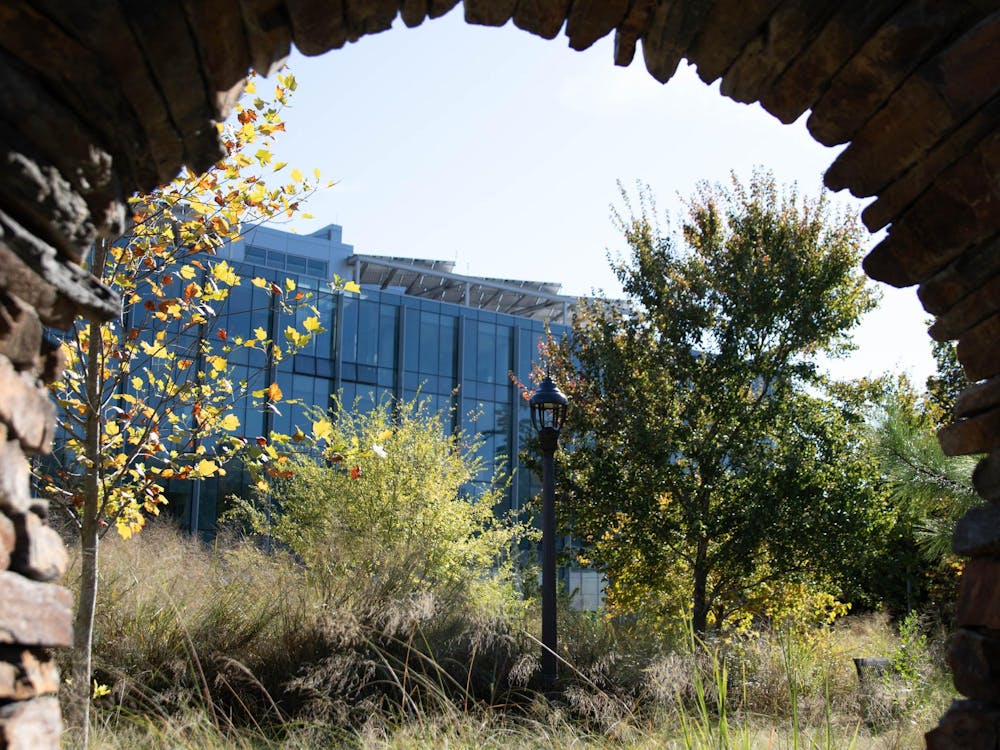The Office of Climate and Sustainability hosted the final installment of its Investing for Mission-Driven Institutions seminar series Tuesday evening, which invited participating students and faculty to reflect on the previous eight sessions and share their takeaways.
After several rounds of discussion, participants came to a consensus that Duke has an obligation to pursue sustainable and climate-conscious investment management strategies in order to be aligned with the University’s mission, which includes the Climate Commitment that was launched in September 2022. However, attendees remained divided on the best approaches to achieve such alignment.
“The Climate Commitment really means nothing if it is not integrated and connected to the endowment,” said Sarah Raskin, Colin W. Brown distinguished professor of the practice of law and one of the series' moderators.
Tim Profeta, senior fellow at the Nicholas Institute for Energy, Environment and Sustainability and fellow moderator, opened the dialogue by making a caveat that the body does not have any formal decision-making power.
“This is an effort to create a community [where] we can learn together … it was not intended to replace [the Advisory Committee on Investment Responsibility] or the Board [of Trustees] or the president,” he said.
Profeta then called back to the first session in the series, which initially posed the question of how best mission-driven institutions can “balance their fiduciary requirements with interests in requiring investment decisions to reflect core institutional values, including sustainability and climate commitments.”
Raskin modified this question by saying she believes the series’ participants “learned pretty early on that [fiduciary duty and institutional values] are actually aligned.”
This comment was informed from discussions led by the series’ six faculty and student moderators over the past year on such topics as the definition of fiduciary duty, opportunities for climate investing, the definition of climate risk, equity considerations, regulatory considerations and shareholder influence, a closer look at the operations of indirect investment structures and strategies taken by peer institutions.
Each of these sessions featured insights from experts across fields related to the issue of mission-driven investing, primarily from the finance sector. While the perspectives of these guest speakers varied, participants in Tuesday’s discussion noted that several expressed the view that divestment is not only feasible but financially prudent in light of increasing climate risk and a global shift toward renewable energy sources.
“For an endowment as sophisticated as [Duke’s] to not be accessing those tools is … a potential breach of their fiduciary duty,” Raskin said in response to debate over the feasibility of carbon accounting, the process of quantifying greenhouse gas emissions produced by businesses in which the endowment’s funds are invested.
“There are people that are doing it, so why shouldn’t we?” graduate student and moderator Meera Ayyagari asked, referencing peer institutions that have already divested.
Profeta encouraged the session’s participants to think of a “goal statement” that would incorporate what they had learned from the series and inform possible future action by University administration on the issue of responsible investing. Suggestions included increasing transparency around where the endowment’s funds are invested, creating a statement of principles to guide responsible investment practices, establishing a carbon neutrality goal for the endowment and allocating a portion of the endowment’s funds to be directed toward investment in “green” businesses and climate solutions.
“To most students, I think, until we see financial commitments from Duke that are tangible … nobody’s going to really believe that the Climate Commitment extends past looking good and looking like 'the climate university,'" said senior Abby Saks, co-president of Duke Climate Coalition who attended the majority of the sessions.
DCC has pushed for divestment for over a decade, with an uptick in mobilizations in recent years. Most recently, the student group staged a demonstration on Abele Quad and at the Karsh Alumni and Visitors Center during Alumni Weekend in partnership with Our Urban Future to call attention to their grievances relating to divestment, fossil fuel industry-funded research and campus sustainability and accessibility issues.
There was some debate around whether student perspectives hold any weight in the Duke University Management Company’s (DUMAC) decisions. DUMAC manages the investment of the University’s endowment.
Emma Rasiel, Richard Y. Li professor of the practice of economics and ACIR chair, commented that “ultimately … DUMAC’s job is to be professional investors, not to try to take votes from the community about all of their investments.”
A number of students present in the room had previously noted that the lack of any projected impact of their advocacy work left them feeling frustrated and unsupported by the University.
Profeta advocated for directing “all the energy that’s in this room and anger at the lack of action” toward working in partnership with DUMAC to achieve tangible change.
A previous session featuring Robert McGrail, head of legal and compliance at DUMAC, revealed that the organization did not have the capacity to analyze all the data at their disposal and use it to inform more deliberate investment decisions. This statement was corroborated by an address to Academic Council by President Vincent Price in March, in which he alleged that DUMAC neither has access to sufficient data nor the resources to thoroughly analyze existing data. Therefore, he claimed that “it is presently not possible for DUMAC to account for carbon emissions in its portfolio.”
Profeta previously offered to take up the charge and assist DUMAC in this data analysis process, an offer that he restated during Tuesday’s conversation.
Multiple attendees qualified that any future action must come with both concrete goals and institutional support before tangible change is possible.
The OCS is holding a final bonus session featuring members of the Advisory Committee on Investment Responsibility to discuss their February report recommending that DUMAC not divest the University’s endowment from its holdings in fossil fuel companies. The discussion will take place May 2 at 5:30 p.m. in the Rubenstein Library's Holsti-Anderson Family Assembly Room, and a Zoom link will also be available.
Get The Chronicle straight to your inbox
Signup for our weekly newsletter. Cancel at any time.

Zoe Kolenovsky is a Trinity junior and news editor of The Chronicle's 120th volume.

